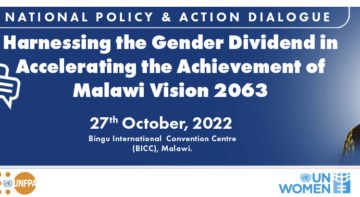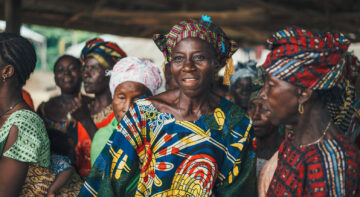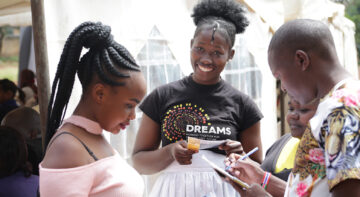Actualités

On Saturday, 20 January, 2018, AFIDEP and PAWA254, hosted a science-policy café on rights, governance and youth empowerment in Kenya. PAWA254 is an activism outfit that uses art as a tool for transformation and advocacy for civic engagement through writing, dance, poetry, graffiti, theatre, music, film and photography.
The café was dedicated to highlighting the role of evidence in driving Kenya’s development aspirations and how investments in youth can transform Kenya’s socio-economic landscape. Particularly, the café engaged youth on why good governance is critical for Kenya to harness a demographic dividend, and why youth need to play an active role in keeping the government accountable. While the demographic dividend brings economic benefits that are attributable to the shift of a country’s population from one with child dependents to one with more people in the working ages, this shift has to be accompanied by investments in human capital development, economic reforms that in turn will spur growth in jobs and inclusive development, and reinforced by practicing good governance and accountability. Furthermore, rights, governance and youth empowerment form one of the four pillars in the African Union (AU) roadmap on harnessing the demographic dividend through investments in youth.
Kenya is no different as to what it takes to achieve a sizeable demographic dividend. The United Nations (UN) Population Division estimates that children and young people below the age of 35 form 76 percent of Kenya’s population. Tthis translates to young people accounting for about 8 out of every 10 Kenyans. As a result, policy decisions and government programme actions should ideally be aimed at meeting the needs of this large youthful population, particularly through investments in critical areas of human capital development such as education and skills development, as well as health and well-being. Moreover, it is also vital for Kenyan youth to be actively engaged in the decision-making processes, especially in matters that affect their lives now, and in the future. While Kenya has adopted policies to include and improve youth involvement in governance, there are still some significant gaps that hamper this from becoming a solid reality.
The café featured a context-setting presentation from AFIDEP’s Dr. Bernard Onyango, who reiterated the enormous promise that Kenya’s sizeable youth population presents for Kenya’s future development. With his presentation, « We are 76 percent », Dr. Onyango impressed on the audience the need for the youth to understand their rights as youth and citizens of Kenya. He challenged those in the audience to proactively seek and acquaint themselves with the international and regional instruments from which Kenya’s laws and policies on youth matters are drawn, such as the African Youth Charter (AYC) and the African Charter on Democracy, Elections and Governance.
Central to the discussions was a panel session with guests from varied backgrounds and organisations: Boniface Mwangi, a photojournalist, activist, PAWA 254’s founder and one of the aspirants who vied for the Starehe Constituency parliamentary seat in Kenya’s August 2017 election; Lydia Mathia, an advisor for youth affairs at the Ministry of Public Service, Youth, and Gender Affairs; Raymond Ochieng, the CEO National Youth Council; and Stella Agara, a tax justice activist and a consultant on leadership and governance. The panel session was moderated by AFIDEP’s Dr. Rose Oronje.
During this session, several important points were raised and discussed at length what it means to have the youth participate in governance and decision-making in Kenya’s socio-political context. Political manifestos, for example, tools that politicians in Kenya often use to publicly declare their development priorities and aims, came under scrutiny during this session. Boniface Mwangi remarked that the average voter often doesn’t identify with their prospective political leader in terms of a manifesto. Instead, he said that most voters look to party affiliations to inform their choice of a candidate. Speaking of his experiences on the campaign trail during the August 2017 elections, Boniface, a youth himself, recalled coming across people who used his manifesto to light fires in their homes. According to him, money, tribe and party affiliations seem to be the currency when it comes to deciding who gets elected by Kenyans.
On the flipside, some of the panelists asserted that even when promises are made outside of manifestos, youth have in the past proven themselves inadequate in following up on these commitments. Lydia Mathia, for example, argued that in the 2017 election, there were several attempts across the political divide to respond to challenges that affect the youth. She pointed that analyses were done on priorities previously laid down, such as reducing youth unemployment; youth inclusion in the development of policy frameworks relating to youth issues; and improving the ease of doing business for young entrepreneurs. However, while youth voices are being heard and issues that affect them are being noted and included in national development frameworks, the youth do themselves no favours by not following up on whether these frameworks are being implemented, or not. To this, Stella Agwara opined that the youth should start by gaining membership in political parties and/or other organised groups that engage leaders on fulfilling their mandates in office. Without this level of involvement, participation in holding leaders accountable will simply remain on the streets and online « which explains the emergence of the so called « keyboard warriors« , a colloquial term referring to youth who protest on social media. Further, with the masses not paying mind to the parties and individuals who have shown competence, share their values and provide stable unbiased leadership, political manifestos have only become repetitive, their contents recycled with every election and no one hardly notices.
In conclusion, the panelists agreed that for the youth to be real agents of change and strengthen Kenya’s development (including governance), they would have to become uncomfortable with the status quo. Kenya’s youth also need to be better organised and push for change more strategically. While civic protests are in some instances necessary, there are other mechanisms youth can adopt in order to push for change and achieve sustainable impact.
Look out for a follow up conversation this coming Saturday (27 January 2018) on the role of media in keeping the government and other political leaders accountable. Follow the conversation on Twitter #YouthCafeKE and RSVP here
Related Posts





